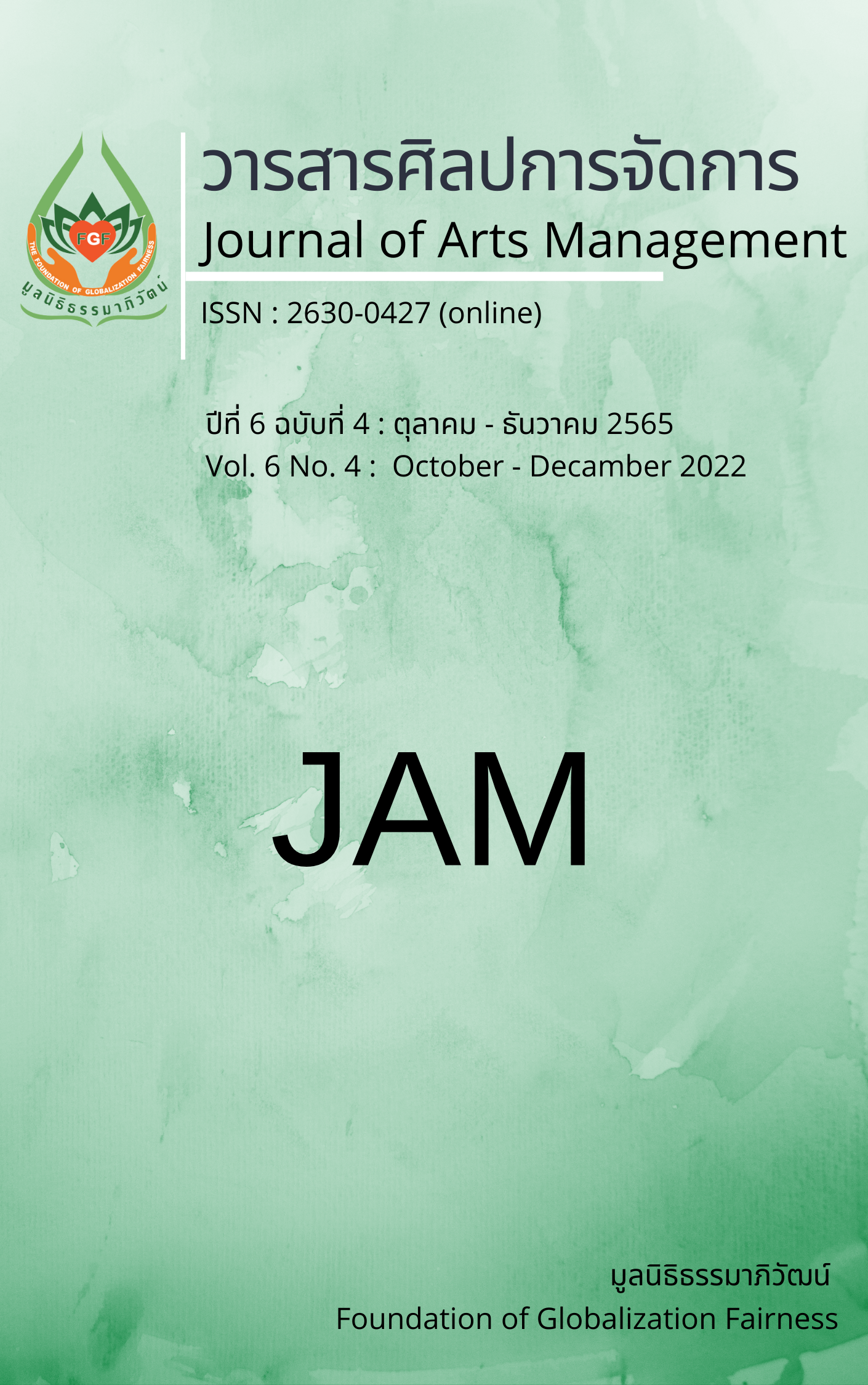The Influence of Risk Perception on Religious Tourism Destination Loyalty in Chiang Mai in the Context of the COVID-19 Pandemic
Main Article Content
Abstract
This article aimed to study (1) the risk perception of religious tourists in Chiang Mai; (2) the loyalty of religious tourists to religious tourism destinations in Chiang Mai; and 3) the influence of risk perception on religious tourism destination loyalty in Chiang Mai in the context of the COVID-19 pandemic. This research was a quantitative method. The instrument for collecting data was a questionnaire. Analysis of data by descriptive statistics and multiple linear regression analysis. The research results were found as follows:
1. The overall risk perception of religious tourists in Chiang Mai in the context of the COVID-19 pandemic was at a moderate level, and risk perception in all four components, namely performance risks, social risks, health risks, and financial risks, was also at a moderate level.
2. The overall loyalty of religious tourists to religious tourism destinations in Chiang Mai in the context of the COVID-19 pandemic is at a high level. The level at which tourists recommend and share positive experiences of Chiang Mai as a religious tourism destination with others was at a high level.
3. The influence of risk perception on religious tourism destination loyalty in Chiang Mai in the context of the COVID-19 pandemic was statistically significant at the 0.05 level, with only one component being perceived health risks.
Article Details

This work is licensed under a Creative Commons Attribution-NonCommercial-NoDerivatives 4.0 International License.
Views and opinions appearing in articles in the Journal of Arts of Management It is the responsibility of the author of the article. and does not constitute the view and responsibility of the editorial team I agree that the article is copyright of the Arts and Management Journal.
References
Álvarez-García, J., Del Rio Rama, M.d.l.C., & Gómez-Ullate, M. (2018). Handbook of research on socio-economic impacts of religious tourism and pilgrimage. https://www.researchgate.net /profile/Jose-Alvarez-Garcia/publication/326786619_Religious_Tourism_and_ Pilgrimage_Study_of_Academic_Publications_in_Scopus/links/5b641ff8aca272e3b6ac9fbb/Religious-Tourism-and-Pilgrimage-Study-of-Academic-Publications-in-Scopus.pdf
Biswakarma, G. (2017). Impact of destination image and perceived risk on behavioral intention of travelers to Nepal. International Journal of Advanced Research and Publications, 1(5), 62-71.
Chiang Mai Governor Office. (2021). COVID-19 situation in Chiang Mai. http://www.chiangmai.go.th/covid19/
Chitpakdee, P. W. N., Dokbua, F., & Anothai, S. (2020). Guideline for applying Buddhist and postmodern philosophy in the development of Buddhist tourism in Songkhla Province. Journal of Social Science and Buddhistic Anthropology, 5(6), 58-67.
Chua, B.-L., Al-Ansi, A., Lee, M. J., & Han, H. (2020). Impact of health risk perception on avoidance of international travel in the wake of a pandemic. Current Issues in Tourism, 1-18. https://doi.org/10.1080/13683500.2020.1829570
Cossío-Silva, F.-J., Revilla-Camacho, M.-Á., & Vega-Vázquez, M. (2019). The tourist loyalty index: A new indicator for measuring tourist destination loyalty?. Journal of Innovation & Knowledge, 4(2), 71-77. https://doi.org/10.1016/j.jik.2017.10.003
Economics Tourism and Sports Division. (2021). Spiritual Tourism (Tourism Economice Review, Issue 1).
Eom, T., Han, H., & Song, H. (2020). Discovering the perceived attributes of CBT destination travelers in South Korea: A mixed method approach. Tourism Management, 77, 1-13. https://doi.org/10.1016/j.tourman.2019.104013
George, D., & Mallery, P. (2016). IBM SPSS Statistics 23 Step by Step: A Simple Guide and Reference (14th ed.). Routledge.
Godovykh, M., Pizam, A., & Bahja, F. (2021). Antecedents and outcomes of health risk perceptions in tourism, following the COVID-19 pandemic. Tourism Review, ahead-of-print(ahead-of-print). https://doi.org/10.1108/tr-06-2020-0257
Godovykh, M., & Tasci, A. D. A. (2020). The influence of post-visit emotions on destination loyalty. Tourism Review, 76(1), 277-288. https://doi.org/10.1108/tr-01-2020-0025
Hang, H., Aroean, L., & Chen, Z. (2020). Building emotional attaching during COVID-19. Annals of Tourism Research, 83, 1-4. https://doi.org/10.1016/j.annals.2020.103006
Infosearch. (2019). The survay of Thai travel behaviour 2019.
Infosearch. (2021). The survay of Thai travel behaviour 2020.
Kock, F., Norfelt, A., Josiassen, A., Assaf, A. G., & Tsionas, M. G. (2020). Understanding the COVID-19 tourist psyche: The evolutionary tourism paradigm. Annals of Tourism Research, 85, 103053. https://doi.org/10.1016/j.annals.2020.103053
Ministry of Tourism and Sports Thailand. (2022). Domestic tourism statistics (Classify by region and province 2021). https://mots.go.th/more_news_new.php?cid=630
Patwardhan, V., Ribeiro, M. A., Payini, V., Woosnam, K. M., Mallya, J., & Gopalakrishnan, P. (2020). Visitors’ place attachment and destination loyalty: Examining the roles of emotional solidarity and perceived safety. Journal of Travel Research, 59(1), 3-21. https://doi.org/10.1177/0047287518824157
Raj, R., Griffin, K., & Korstanje, M. E. (2018). Risk and safety challenges facing religious tourism: An introduction. In M. E. Korstanje, K. Griffin, & R. Raj (Eds.), Risk and Safety Challenges for Religious Tourism and Events. CABI.
Rashid, A. G. (2018). Religious tourism – a review of the literature. Journal of Hospitality and Tourism Insights, 1(2), 150-167. https://doi.org/10.1108/jhti-10-2017-0007
Rinschede, G. (1992). Forms of religious tourism. Annals of Tourism Research, 19.
Ruttanavisanon, W., & Agmapisarn, C. (2022). Religious tourism in Thailand - A review of Thai literature from 2012-2021. Social Science Asia, 8(1), 12-25.
Sánchez-Cañizares, S. M., Cabeza-Ramírez, L. J., Muñoz-Fernández, G., & Fuentes-García, F. J. (2020). Impact of the perceived risk from Covid-19 on intention to travel. Current Issues in Tourism, 1-15. https://doi.org/10.1080/13683500.2020.1829571
Silpjaru, T. (2014). Research and analysis of statistical data with SPSS and AMOS (15th ed.). S.R. Printing Mass Products.
Wang, Y. C., Liu, C. R., Huang, W. S., & Chen, S. P. (2020). Destination fascination and destination loyalty: Subjective well-being and destination attachment as mediators. Journal of Travel Research, 59(3), 496-511. https://doi.org/10.1177/0047287519839777
World Tourism Organization. (2014). Tourism can protect and promote religious heritage. https://www.unwto.org/archive/europe/press-release/2014-12-10/tourism-can-protect-and-promote-religious-heritage
Zhan, L., Zeng, X., Morrison, A. M., Liang, H., & Coca-Stefaniak, J. A. (2020). A risk perception scale for travel to a crisis epicentre: visiting Wuhan after COVID-19. Current Issues in Tourism, 1-18. https://doi.org/10.1080/13683500.2020.1857712


